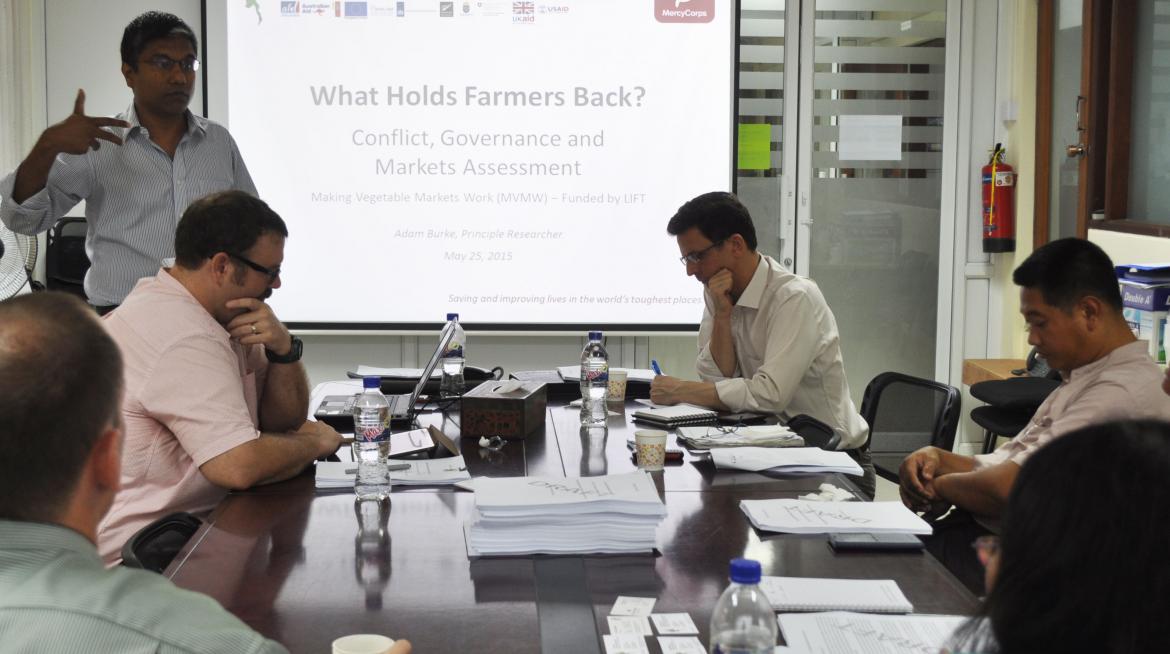
Findings from the study ‘What holds Farmers Back? Conflict, Governance and Markets Assessment’ by Mercy Corps consultant Dr Adam Burke.
To improve agricultural productivity and livelihoods, it is important to understand the politico-economic environment surrounding agriculture in a given area. In Myanmar, agricultural law and policy is being transformed, while private sector involvement is increasing at a rapid pace. In such an environment, how does the small farmer protect herself?
LIFT funds the Making Vegetable Markets Work (MVMW) project which aims to increase incomes for smallholder vegetable farmers. MVMW works from the farm level up to national policy level, strengthening the vegetable market, the enabling environment, and supporting markets in financial services and agricultural inputs. It is implemented by partners Mercy Corps, Swiss contact, and East-West Seed International.
On 25 May, LIFT hosted a presentation by Mercy Corps consultant Dr Adam Burke on the findings of his study ‘What holds Farmers Back? Conflict, Governance and Markets Assessment’ which looks at the reasons behind the unwillingness of rural farmers in southern Shan State to take risks.
Main findings:
The study confirmed that the vegetable farmers are highly vulnerable to a range of factors making them unwilling to take on risk. This reduces their scope to innovate and to buy good quality inputs. Technical advice on better farming methods, then, may not be heeded for rational reasons of risk avoidance. Unless this vulnerability is tackled, it is unlikely that smaller farmers, in particular, will be able to respond optimally to new market opportunities.
The study identifies seven major challenges for farmers:
1) Volatile market prices – this makes farmers reluctant to invest in case they end up in debt. Volatile prices stem largely from limited and unstable markets, including domestic and international trade.
2) Relations between farmers and the market – some barriers exist but they are less significant than may be thought given a relatively open environment, especially for lowland, accessible areas.
3) High input costs – fertilizer, seed, and pesticides are all seen as expensive while rising labour costs make planting and harvesting difficult.
4) Information – farmers are often knowledgeable and make rational choices but have limited access to impartial information on new methods or the effectiveness of different inputs.
5) Limited access to credit
6) Weak associations – until recently, most non-governmental group activity was banned and there were few initiatives to support association. This legacy is a serious constraint.
7) Managing the environment – Land and water are the two biggest concerns for farming and in both cases concerted action is needed if vegetable farming is to progress significantly.
Further concerns include transport, differential treatment of certain groups, and a general lack of government support.
The study proposes these recommendations:
- Reduce risks for farmers
- Recognise the constraints they operate under
- Improve communication between farmers and extension services
- Develop farmer groups that focus on specific objectives
- Pilot/support ways to increase demand, especially for higher quality vegetables, such as off-farm processing
- Develop ways to benefit from comparative experience of vegetable farming in similar environments
- Promote sustainable and just contract farming
- Targeted, researched support for selected exports to identified markets
- Promote affordable credit
- Support effective and equitable land certification
- Build coalitions and find advocacy opportunities
- Continue to pursue multi-stakeholder approaches
- Recognise some conflicts of interest, especially between input companies and farmers
- Consider higher-level and more comprehensive efforts to promote farmers’ livelihoods and rights as a political priority
- Recognise the constraints that exist within central government departments and their local offices, focusing on specific issues where progress may be viable
- Consider engagement with relevant local government bodies including elected state parliaments and Self-Administrative Zones
- Advocate measures that might smooth price volatility both locally and nationally
- Advocate better management of imports and facilitation of specific exports
- Advocate reduced input costs and better regulation of legal and illegal inputs
- Conflict Management
- Recognise that conflict and ethnic tensions are a core aspect of politics and governance in Shan state. Even currently peaceful areas can become more violent
- Consider how and whether to address concerted challenges in upland areas where militia operate and opium is produced
- Integrate concerns over local resource conflict management (water, land etc.) into approaches
- Take practical measures including staff awareness training and audits of employee diversity. Consider whether more staff from the project area can be employed
Also participating in the talk were Mr. Nilan Fernando (Country Director, Mercy Corps), Mr Brian Walter King (Program Director of MVMW, Mercy Corps), Ms Claudia Antonelli (EU representative to LIFT), Mr Thomas Parks (DFAT Governance and Fragility Specialist), and Mr Rudi Schuetz (Senior Technical Advisor, Swisscontact).
You can find the slides here.


